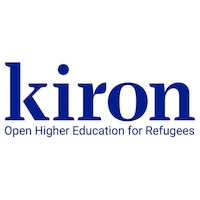

Refugees and forcibly displaced persons face exceptional obstacles when accessing higher education in their host or home countries and the UN High Commissioner for Refugees (UNHCR) estimates that less than 3% of refugees, asylum-seekers, and internally displaced people globally have access to higher education. Technology has the potential to dramatically increase access to education for the most vulnerable communities, thereby unleashing the huge potential of young refugees. Kiron provides access to higher education learning for refugees who lack the documents, language skills or specific study skills to enter a university or find a job. On the digital Kiron Campus, they can work towards closing a potential knowledge gap, refreshing previous knowledge, or start studying already while they fulfill missing requirements. The Kiron Campus is completely digital and accessible for free worldwide. It can be accessed via desktop and mobile phone. Kiron's vision is a world in which everybody has an equal chance to access and succeed in higher education. Our mission is to provide digital learning opportunities for academic, professional, and personal growth. Currently, we have more than 12,000 students in more than 85 countries but our most significant student population is in the Middle East, Germany, and Turkey. We have offices in three countries, Germany, Jordan, and Lebanon, where we support our students through selected additional offline programs. In Jordan and Lebanon, our program is also open to underserved members of the local host community. The fundamental aim of our work is to empower refugees to make self-determined choices about their future, be it academic or professional careers. By this, the number of refugees forced to do informal work - subjected to lower wages and exploitation - is decreased and instead, students take an active stance in shaping their futures. While studying at Kiron, students gain the skills to become critical members of society, which ultimately, brings about the potential to reduce barriers between groups. Additionally, we are active in shaping policies around digital education for refugees, working closely with stakeholders, governments, and activists. We are pushing towards a re-definition of the role of digital learning in higher education and, in the same vein, towards a more sustainable integration of refugees in the higher education realm. Over the next few years, we will extend our offer to provide even more high-quality learning resources that are tailored to our students' needs. We will work even closer with our students, making the Kiron Campus even more inclusive. We strive to reach out to more female learners, improve access for students in low bandwidth and conflict regions, and aim to close the learning gaps that our students currently face.